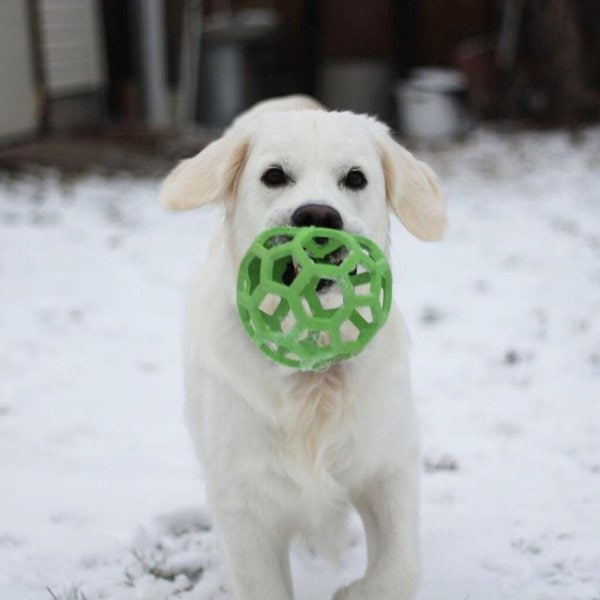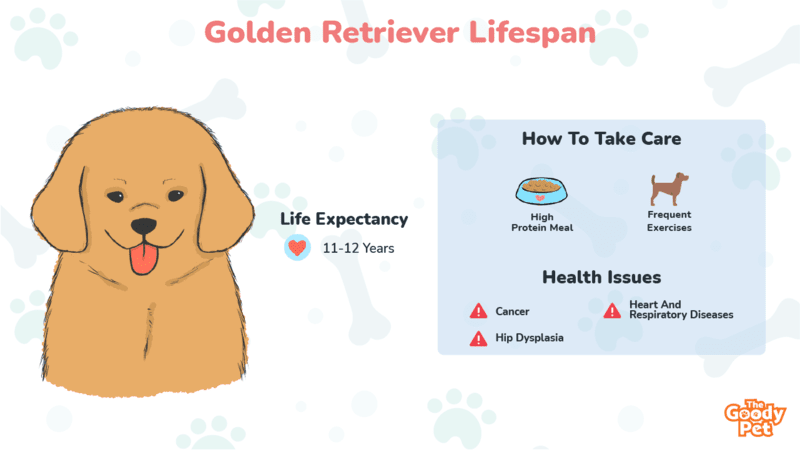We all love and adore Golden Retrievers, and wish they could be with us forever, but the painful truth is, this is one dog breed that is known for having a relatively short lifespan.
What are the common health issues of a Golden Retriever? Health issues that a Golden Retriever is commonly predisposed to include cancer, bloat, hip and elbow dysplasia, and various heart and respiratory diseases. Of the aforementioned health conditions, cancer is the deadliest disease to a Golden Retriever, and is responsible for more than half of all Golden deaths.
It’s not all doom and gloom though, and with proper nutritional and physical care, and by keenly paying attention to your Golden Retriever’s health status, you can manage to significantly extend your pooch’s lifespan. We’ve outlined how you can take better care of your Golden Retriever in this article, but before we get there, let’s take a look at why this dog breed is prone to living a short life.
Why Do Golden Retrievers Have A Short Lifespan?
The lifespan for a Golden Retriever averagely falls between 11 to 12 years. And when converted to human age, this is roughly between 65 to 69 years of age.
What Is Responsible For A Golden Retriever’s Short Lifespan?
Back in the days, Golden Retrievers were well capable of living up to 16 to 17 years of age, but this is a figure that has witnessed a sharp decline in recent years. And a Golden Retriever now typically leads a shorter life, compared to other dog breeds, due to the barrage of health problems that this pooch may be subjected to during its lifetime.
Factors that may have contributed to the sharp decline in the Golden Retriever’s life expectancy over the years may be sketchy at the moment. But the Morris Animal Foundation’s research programme, which kicked off in 2015, is looking to shed more light on the conundrum.
The aim of this research programme is to collect health, environmental and behavioral data on over 3,000 enrolled Golden Retrievers. And this is done to identify nutritional, environmental and genetic factors responsible for the particularly high rate of cancer and other important diseases in Golden Retrievers.
In the meantime, while we wait for the final results of this research programme, let’s work with the facts we have on ground. And as we’ve stated earlier, the Golden Retriever is particularly susceptible to several diseases and health conditions, which make up the contents of the next section.

What Do Most Golden Retrievers Die From?
Some of the most common diseases and health conditions that are responsible for suffering and death in our beloved Golden Retrievers include:
Cancer
One disease that is responsible for approximately 60% of all Golden Retriever deaths is the dreaded cancer. This high rate of cancer deaths in Golden Retrievers is one that has continually caused concerns among dog owners, and it can be linked to the pooch’s genetics.
There are several forms of cancer that may attack a Golden Retriever, but the most prominent examples include Hermangiosacoma, Lymphosarcoma, Mast Cell Tumor and Osteosarcoma. Of all the aforementioned examples, the most popular form of cancer in Golden Retrievers is Hermangiosacoma, which typically attacks the lining of the dog’s blood vessel.
Heart And Respiratory Diseases
Apart from cancer, another leading cause of death in Golden Retrievers is any of the several heart, lungs or circulatory health conditions. And one heart defect that is responsible for a significantly high number of Golden Retriever deaths is the Subvalvular Aortic Stenosis (SAS, in short).
Causes of SAS in Golden Retrievers isn’t independent of this breed’s typical large size, and it is characterized by the narrowing of the aorta blood vessel that is responsible for carrying oxygenated blood out of the heart; This, in turn, makes it increasingly difficult for the dog’s heart to push out blood, and it may eventually lead to the pooch’s death.
Bloat
Bloat (also known as Gastric Dilatation Volvulus, GDV) is another serious health condition that can cause death in Golden Retrievers, and other large dog breeds in general. Bloat is the rapid expansion of a Golden Retriever’s stomach, which is caused by the stomach suddenly filling up with gas, food and fluid.
Factors that may cause this sudden expansion of a Golden Retriever’s stomach include unhealthy feeding habits or stress. And if left unattended to, severe cases of bloat can potentially kill a Retriever within hours.
A Golden Retriever suffering from bloat will typically exhibit restlessness, excessive drooling, swelling in the stomach region, pacing, retching, and a tendency to cast nervous glances at its stomach. And immediately you notice any or a combination of these signs, you should seek prompt medical attention for your pooch.
Hip Dysplasia
Hip Dysplasia in Golden Retrievers has a significantly lesser casualty rate than the diseases and conditions mentioned above, but regardless, it has a high occurrence rate in this particular dog breed.
Golden Retrievers suffering from this form of dysplasia typically experience abnormal development of the ball and socket joint that is located at the hips, which may lead to permanent disability of the pooch, if left unattended to.
Common causes of Hip Dysplasia in Golden Retrievers include the breed’s typical large size, inadequate exercising, poor diet, as well as an imbalance in the pooch’s hormonal development. And this condition is characterized by the Retriever’s reluctance to stand from a lying position, limping, hesitation to climb stairs and pain in the hind legs.
Other Health Conditions
Apart from those listed above, other common, less-fatal health conditions that a Golden Retriever is predisposed to include:
- Patellar luxation
- Cataracts
- Hypothyroidism
- Ear infections
- Skin infections

How Do You Know If Your Golden Retriever Is Dying?
Golden Retrievers are considered elderly and typically begin to slow down when they have clocked 8 years and above.
However, this figure is relative and we’ve seen several examples of Golden Retrievers that continue to be active years beyond what is considered to be their prime.
Regardless, common signs that are observed when a Golden Retriever is dying include:
- Lethargy
- Reduction in appetite
- Incontinence
- Tendency to withdraw from social interactions
- Rapid or gradual weight loss
- Pain
- Breathing difficulties
Golden Retrievers suffering and dying from cancer may also show symptoms such as:
- Swellings or lesions on the skin
- Sores that don’t heal
- Bleeding from body openings, and
- Excretory difficulties
What To Do When Your Golden Retriever Is Dying
Once you’ve observed signs that your Golden Retriever is nearing the end of its life, below are steps you can take to ensure its final moments are as comfortable as possible:
Strive To Make The Dog Comfortable
Golden Retrievers that are dying generally tend to sleep more, show a general lack of interest in their usual activities and seek solitude in quiet places. Consequently, you should provide your dying Retriever with a comfortable resting location, and if you notice that it already has a preferred spot, provide lush blankets.
Also, to combat the poor hygiene that is observed in dying Retrievers, you can assist your pooch with some of the grooming practices that it would usually undertake itself. And to assist with incontinence, you can also embrace the use of hygienic pads.
Make Changes To The Dog’s Feeding Plans
To deal with a dying Retriever’s lack of appetite and subsequent weight loss, it can help to feed the pooch smaller meals at a regular interval. You can also embrace the use of appetite stimulants or a special weight management diet plan, but this should be done after consulting your vet.
You should also ensure that your pooch’s food and water bowl are within reach at all times.
Consider Pain Medication
If you notice your Golden retriever displaying signs of excessive pain, you can help relieve some of the pain by offering the appropriate pain medications and homeopathic remedies. However, the administration of pain meds shouldn’t be done without consulting your vet doctor first.

How To Take Better Care Of Your Golden Retriever?
Dietary Needs
Golden Retrievers thrive best on high-quality dog food with a high meat or protein content (30% is great), a reasonable amount of fats (say 12 to 18%), carbohydrates (30 to 35%), and the absence or reduction in the use of fillers such as soy or rice.
When selecting dog food for your Golden Retriever, it is advisable to choose a meal plan that lists meat-based proteins as its first two ingredients, with the absence of grains within the first five ingredients. And this is where the nutritious Pet Plate diet plan for dogs shines best.
With an emphasis on a protein-based formulation, the Pet Plate will ensure that your Golden Retriever gets the required nutrients for a healthy growth. And with the ability to submit your pooch’s physical specifications for a customized meal plan, the Pet Plate diet can be tailor-made to suit your Golden Retriever’s specific needs.
Water is also very important for a Golden Retriever’s growth, and you should ensure that your pooch has easy access to clean, fresh water, at all times. Retrievers generally have strong, healthy teeth, but it also won’t hurt to invest in dental water additives to enhance your pooch’s oral hygiene.
How Often Should You Feed A Golden Retriever?
The frequency with which you should feed a Golden Retriever is largely dependent on the pooch’s age, but in general, puppies should be fed more often than the older dogs.
Ideally, Golden Retriever puppies younger than six months should be fed two cups of high-quality dog food, three times daily, at constant intervals.
For Retriever puppies between six months to one year of age, the amount of food averagely increases to three cups, the frequency should be cut down to twice daily.
And older Golden Retrievers above one year of age will only need to be fed once daily, but this meal should contain between 1,300 to 1,700 calories.
Exercise Requirements
Golden Retrievers are quite energetic dogs, and they require frequent exercising to stay healthy and happy. That said, 20 to 30 minutes of walking, twice daily, or its equivalent in playtime with other dogs or physically and mentally engaging games is sufficient to keep your Retriever mentally stimulated and physically fit.
Additionally, Golden Retrievers are great swimmers, and occasionally taking your pooch for a swim provides a great form of exercise. However, regardless of the Golden Retriever’s status as a great swimmer, you should ensure to keep a close eye on the pooch while swimming to prevent accidents.

Related Questions
What Is The Longest A Golden Retriever Has Lived? The record for the longest living Golden Retriever, dead or alive, belongs to pooch, August (also known as Augie), who has lived for 20 years. Born on the 24th of April, 2000, August was adopted by Tennessee-based couple, Jennifer and Hetterscheidt when she was already 14 years old!
How Much Do Purebred Golden Retrievers Cost? The price to purchase a purebred Golden Retriever varies greatly but you should be prepared to shell out an amount between $500 to $3,000 to buy one of these adorable pups. And the exact amount you’ll spend to purchase a Golden Retriever is dependent on factors such as the breeder, the pooch’s age and health status.
Why Is My Golden Retriever So Lazy? Golden Retrievers are known for their lively and energetic nature, and if your pooch is showing signs of lethargy and laziness, it may be suffering from an injury, a medical problem or a behavioral issue. Additionally, a Golden Retriever that isn’t getting enough exercise and is being fed inadequately, will generally be lazier, compared to other dogs.





